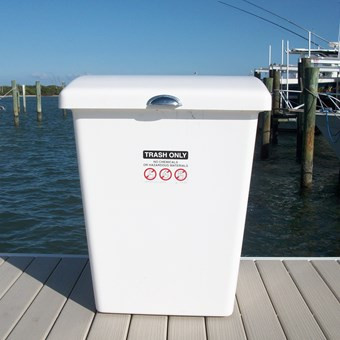Marina Solid Waste Management
Description

The type of solid waste found in marinas includes trash from boat maintenance and repair, the marina office and store, and the boats themselves.
- Boat maintenance and repair examples: shipping boxes, board and metal scraps, cleaning rags, paper, old engine parts, fiberglass chips, sawdust, construction waste, sand blasting waste, floor sweepings, sanding dust, burned out light bulbs, batteries, garbage, bottles, cans, sheet plastic, worn out tarps, dirty filters, etc. Solid waste that has a hazardous component, such as acid from a leaking battery, or toxic antifouling paint chips, may need to be disposed of as hazardous waste.
- Marina office and store examples: waste paper, boxes, shipping materials, floor sweepings, cups, used office supplies, bottles, cans, garbage, etc.
- Boat examples: drink containers, food scraps, garbage, fish cleaning waste, old fishing line, dirty cleaning rags, cigarette butts, papers, plastic bags, utensils and plates, etc. This section discusses BMPs for appropriate disposal of solid waste.
The following laws apply to solid waste disposal. Please read the summary of these regulatory programs in Chapter 6 of the Massachusetts Clean Marina Guide.
- Massachusetts Solid Waste Regulations
- Massachusetts Solid Waste Master Plan
- Massachusetts Waterways Regulations
Best Management Practices
Solid Waste Disposal
Consider incorporating the following BMPs to make trash disposal easy and effective.
- Recycling Strategies: Develop a waste and recycling strategy based on the characteristics of the marina that considers factors such as the number of boats, types of boats and activities, and length of docks. Think of ways to reduce waste generated.
- Used Battery Storage and Disposal: Used batteries must be stored in a single layer on pallets or shelving with an impermeable or sealed base until they can be recycled or disposed of at an appropriate location off-site. If a battery is leaking, it must be disposed of as hazardous waste. If you are unable to collect old batteries, require that customers return their old batteries to the retailer where they bought them.
- Trash Container Placement: Place covered trash receptacles in lighted areas and in locations that are convenient for marina customers. Avoid placing trash containers on docks where trash can be inadvertently blown into the water. Tie down trash containers to stationary fixtures and empty them frequently before they can overflow.
- Trash Covers: Provide covered trash receptacles at boat haul-out and launch sites. Use lids that cannot be blown or fall off and that keep animals out.
- Dumpster Signs: Post a sign at the dumpster listing items that can be disposed of in the dumpster.
- Locate Dumpster Away from the Water: Place the dumpster as far away from the water as is feasible yet still convenient for use. Erect a fence or plant vegetation as a windscreen between the dumpster and the prevailing wind.
- Smoking Signs: If smoking is allowed, provide signs that direct smoking customers to always use ashtrays. Note that discarded cigarette butts are the most common litter found on coastal waters and shores.
- Litter Bag Distribution: Distribute free litter bags to customers to encourage them to bring back all trash.
Staff Responsibilities
To keep the marina grounds clean everyday, your employees should consider the following tips:
- Trash Clean Up: Make picking up stray trash at the marina a daily practice required of all staff.
- Pool Skimmers: Use a pool skimmer or some other net for collecting floating trash around the docks.
- Trash Awareness: Post signs to remind customers where they can dispose of different trash.
Recycling
Recycling provides society with broad environmental benefits, from decreasing demand for natural raw materials to minimizing waste disposal space at landfills. Recycle items that can be collected by your waste hauler and encourage your customers to recycle.
- Recycle as Much as Possible: Materials for recycling will depend on the service company’s capabilities and market demand for different materials. Items that should be considered include scrap metal, aluminum, glass, wood pallets, batteries, paper, plastic, and cardboard. Used oil, oil filters, and other liquids should also be recycled and reused. Contact a waste hauler or your local solid waste recycling coordinator to set up a service to take recyclables away from the marina.
- Community Recycling Participation: If your community has a recycling program, participate fully by providing a marina recycling center with separate marked containers.
- Mark Recycling Containers: Clearly mark each recycling receptacle to prevent mixing of recyclable materials. Containers should be provided for plastics, paper, bottles, cans, and other recyclables. Establish a marked place for used battery recycling.
- Recycling Signs: Post signs to direct customers to the recycling area and to inform them how to separate their waste.
- Recycle Shrink Wrap: If you use shrink-wrap for protecting boats during the winter, consider using recyclable shrink wrap.
Useful Contacts
DEP Solid Waste Program at
www.state.ma.us/dep/bwp/dswm/dswmpubs.htm or (617) 292-5500. Call for more information on solid waste management in Massachusetts.
The 1999 Massachusetts Private Hauler Directory is available from the DEP website at
www.state.ma.us/dep/recycle/files/haulers.pdf.